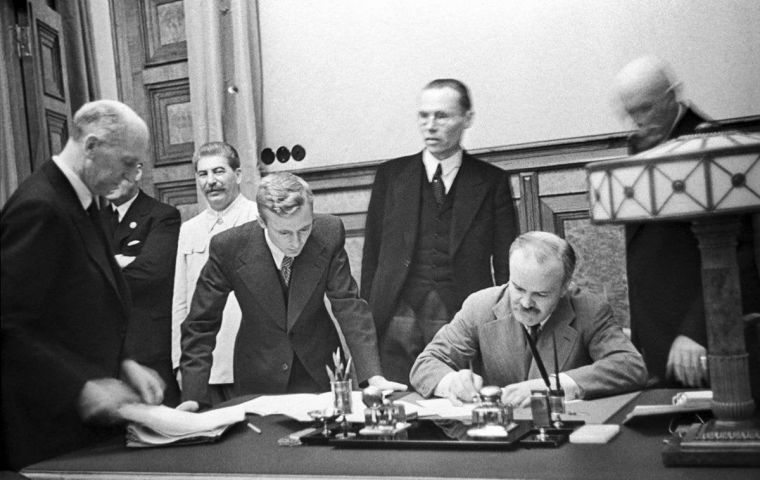MercoPress. South Atlantic News Agency
Black Ribbon Day in remembrance for victims of Communism and Nazism
 On 23 August 1939 the Molotov–Ribbentrop Pact was signed between USSR and Germany, dividing Romania, Poland, Lithuania, Latvia, Estonia, and Finland into designated spheres of influence
On 23 August 1939 the Molotov–Ribbentrop Pact was signed between USSR and Germany, dividing Romania, Poland, Lithuania, Latvia, Estonia, and Finland into designated spheres of influence This Monday most European countries, plus the United States and Canada recalled that 23 August is the European Day of Remembrance for Victims of Stalinism and Nazism, known as Black Ribbon Day.
It is an international day of remembrance for victims of totalitarian regimes, specifically Stalinism, Communism, Nazism and Fascism. It is observed on 23 August and symbolizes the rejection of “extremism, intolerance and oppression”.
It was designated by the European Parliament in 2008/2009 as “a Europe-wide Day of Remembrance for the victims of all totalitarian and authoritarian regimes, to be commemorated with dignity and impartiality”, and has been observed annually by the bodies of the European Union since 2009.
23 August was chosen to coincide with the date of the signing of the Molotov–Ribbentrop Pact, a 1939 non-aggression pact between the USSR and Nazi Germany which contained a protocol dividing Romania, Poland, Lithuania, Latvia, Estonia, and Finland into designated German and Soviet spheres of influence.
The treaty was described by the European Parliament’s president Jerzy Buzek in 2010 as “the collusion of the two worst forms of totalitarianism in the history of humanity.”
The Remembrance Day originated in protests held in western cities against Soviet crimes and occupation in the 1980s, initiated by Canadian refugees from countries occupied by the Soviet Union. The protests culminated in The Baltic Way, a major demonstration during the Revolutions of 1989 that contributed to the liberation of the Baltic states.
23 August is also officially recognized by Canada and the United States, where it is known as Black Ribbon Day.




Top Comments
Disclaimer & comment rulesCommenting for this story is now closed.
If you have a Facebook account, become a fan and comment on our Facebook Page!